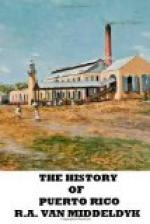Father Dutertre declares that at the time of the arrival of the Europeans the Caribs were contented, happy, and sociable. Physically they were the best made and healthiest people of America. Theft was unknown to them, nothing was hidden; their huts had neither doors nor windows, and when, after the advent of the French, a Carib missed anything in his hut, he used to say: “A Christian has been here!” Dutertre says that in thirty-five years all the French missionaries together, by taking the greatest pains, had not been able to convert 20 adults. Those who were thought to have embraced Christianity returned to their practises as soon as they rejoined their fellows. “The reason for this want of success,” says the father, “is the bad impression produced on the minds of these intelligent natives by the cruelties and immoralities of the Christians, which are more barbarous than those of the islanders themselves. They have inspired the Caribs with such a horror of Christianity that the greatest reproach they can think of for an enemy is to call him a Christian.”
The reason the Spaniards never attempted the conquest of the Caribs is clear. There was no gold in their islands. They defended their homes foot by foot, and if, by chance, they were taken prisoners, they preferred suicide to slavery. Toward the end of the eighteenth century there still existed a few hundred of the race in the island of St. Vincent. They were known as the black Caribs, because they were largely mixed with fugitive negro slaves from other islands and with the people of a slave-ship wrecked on their coast in 1685. They lived there tranquil and isolated till 1795, when the island was settled by French colonists, and they were finally absorbed by them. They were the last representatives in the Antilles of a race which, during five centuries, had ruled both on land and sea. On the continent, along the Esequibo and its affluents, they are numerous still; but in their contact with the European settlers in those regions they have lost the strength and the virtues of their former state without acquiring those of the higher civilization. Like all aboriginals under similar conditions, they are slowly disappearing.
FOOTNOTES:
[Footnote 89: Revista Puertoriquena, Tomo I, Ano I, 1887.]
[Footnote 90: The word “cannibal” is but a corruption of guaribo, is, “brave or strong,” changed into Caribo, Cariba, and finally that Carib. The name Galibi, also applied to the Caribs, means equally strong or brave.]
[Footnote 91: The author visited this region and sketched some of the ruins of these Jesuit-Guarani missions, of which scarcely one stone has remained on the other. They were destroyed by the Brazilians after the suppression of the Society of Jesus by Pope Clement XIV in 1773; the defenseless Indians were cruelly butchered or carried off as slaves. The sculptured remains of temples, of gardens and orchards grown into jungles still attest the high degree of development attained by these missions under the guidance of the Jesuit fathers.]




